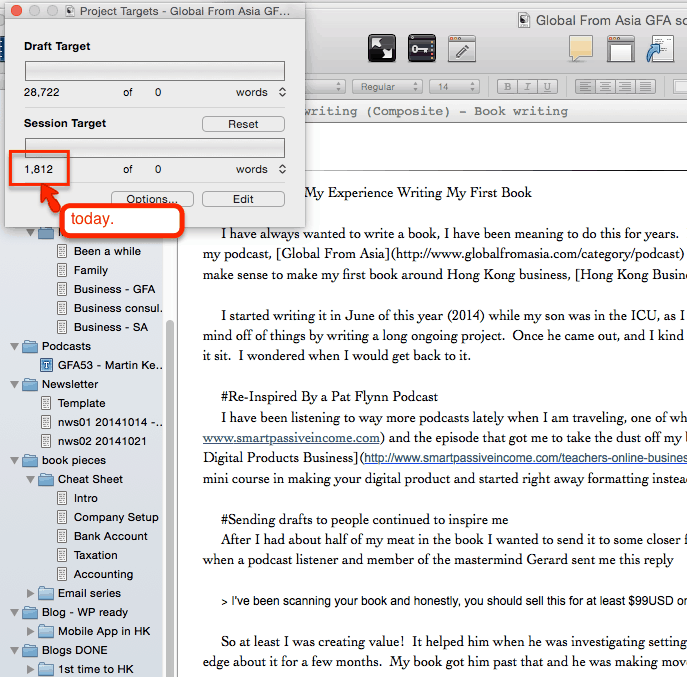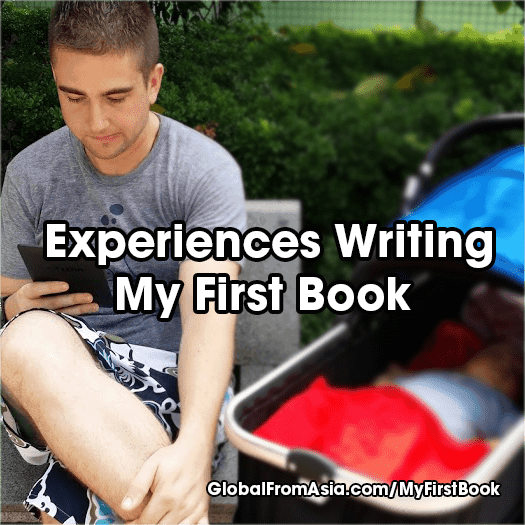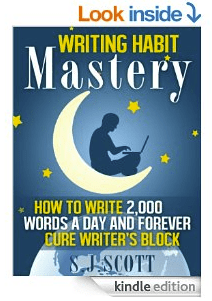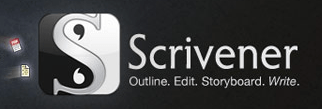Sharing How I Wrote My First Book (Plus Free Template)
This was originally posted on Global From Asia – but since I’m an author of many books now, it seems more suitable on my personal author blog, Mike’s Blog.

Today is a special day, I have released my first book: Hong Kong Business Supercharged. I have always wanted to write a book; I have been meaning to do this for years. I thought it would be “my story” as the first one, but after starting my podcast, Global From Asia Podcast, and having a year’s worth of interviews and an audience, it would make sense to write my first book about Hong Kong business.
I started writing it in June of this year (2014) while my son was in the ICU as I couldn’t think much about other things and it helped me take my mind off of things by writing a long ongoing project. Once he came home, and I kind of got stuck on how to format it (I was doing it in Google docs), I let it sit. I wondered when I would get back to it.
Re-inspired by a Pat Flynn podcast
I have been listening to more podcasts lately when I am traveling, one of which is the popular Pat Flynn Smart Passive Income, and the episode that got me to take the dust off my book was the 2 teachers Shane and Jocelyn Sams Build their Digital Products Business. After listening I took them up on their free mini-course in making your digital product and started right away formatting in Google presentations instead of in docs.
Sending drafts to people continued to inspire me
After I had about half of my meat in the book, I wanted to send it to some closer friends for feedback, looking for direction and motivation. It helped when a podcast listener and member of the mastermind Gerard sent me this reply:
I’ve been scanning your book and honestly, you should sell this for at least $99USD once it’s finished. So much valuable info!
So at least I was creating value! It helped him when he was investigating setting up a Hong Kong company from the Netherlands, and he was on the edge about it for a few months. My book got him past that and he was making moves and taking action. So exciting and it inspired me.
Other business friends also gave positive feedback, so it motivated me to keep on writing.
SJ Scott podcast on writing habits
I listened to another Pat Flynn podcast, with SJ Scott on building your book empire . After that I got his book SJ Scott’s Writing Mastery – Getting over Writer’s Block
- Writing every morning, 7:30am to at least 9am, sometimes later. Making a schedule of times you will always write helps a lot, and I told my family, friends, and work colleagues this is my writing time and scheduled everything else around it. I feel so satisfied that by 9am I have written almost 2,000 words, the rest of my day is amazing.
- Just WRITE, don’t worry about editing. It’s two different parts of your brain. I used to write and edit; now I write and edit after.
- Committed to writing 1,000 words/ day. I made a Google spreadsheet and followed the columns SJ Scott recommends, such as start time, stop time, how many words, and notes. I did miss two days of writing, and even on the days I missed it, I would enter why I didn’t write.
- Studied Touch typing. I had never studied how to properly type; I’m not really “hunt and peck,” but I didn’t always have my fingers in the right position. I studied and memorized it over about a week. Still need more practice but did make considerable improvements.
- Got a Writer’s Totem (Yoda). Some people say its geeky, but I think it is cool, while I was doing my Hua Qiang Bei Shenzhen market tour video, I saw a Yoda doll USB key and thought it would be a great totem to keep on my desk while I was writing, so that the force is with me.
Photo of my Yoda Writer’s Totem
A photo posted by Michael Michelini (@mikemichelini) on Oct 10, 2014 at 7:19pm PDT
Scrivener
Chris Moore thanks for the tip on Scrivener, he read over my draft and gave me a ton of feedback on the book, plus he saw the way I was formatting it, so suggested I move to a tool writer’s love called Scrivener. Its basically an amazing way to break a writing project into chunks (I’m now even writing this blog post in it) and then doesn’t let you worry about all the formatting and editing until AFTER you get the meat of the content written. So I took all the content I had been writing in various files (had a couple google docs and a google presentation file for the book at the time) and put it all together in Scrivener in chunks that I could then re-organize and shuffle around.
Wrote 25,000 words in 2 weeks
Once I got the groove going with the above setup, Scrivener, Writing Journal, Touch Typing improvements, morning writing routine, I was writing between 1,000 and 3,000 words per day, weekends included, which totaled up to 22,000 words from September 20 to October 3, 2014.
Tip: Gamifying It Helps
In Scrivener, you can see how many words are in your current document, plus you can go to PROJECT -> Show Project Targets and it shows you how many words you typed since midnight. It was much easier and more satisfying than trying to keep track in a Google document.

Tracked Daily Progress
Based on the SJ Scott Writing Mastery book (mentioned above), I took him up on the advice to make a daily writing journal. I used Google spreadsheets since it’s “in the cloud” and syncs anywhere. Here is a public Google Spreadsheet for a Writer’s Journal I made that you can copy and use yourself – do it!
Tip: I use TaskLabels for a to-do list
Breaking the book into chunks made it more manageable, and I could check off a checkbox for each section as I wrote it. I would also think about which section I was going to write the night before, so I could sleep on it and let it simmer.
I used the free mobile app Task Labels to make the list and track it(full disclosure, I am currently consulting for the parent company of task labels, but can honestly say the product is awesome and more people need to know about it). They also have a web version that I can log in to as well, but for the most part I use the mobile version and set it to BIG TEXT (you can adjust the size of the text).
Made a new friend and found an awesome editor
Russell Smith, thanks man! We met from my sohelpful call profile and clicked from there. He is working on helping Amazon sellers start their own brands by buying direct from China, and we talked. He loved that I was making this book about Hong Kong business and told me he also has a content editing business. Such a coincidence, right? Life sometimes works out that way and we have been working well together with his amazing help in checking over my horrible writing!
Studying How To Market And Launch The Book
This part is extremely overwhelming. There is just so much information out there. And it is changing so quickly. Launch strategies, email series, cross promotions, bundling. Amazon or not? KDP or not. I tried my best, but here are the best resources that I could find so you can go through it yourself:
Podcasts I listened to
I only really started listening to podcasts in 2014, and I wish I had done it earlier. I learn so much, and for this book marketing stuff I was sent podcasts from friends:
- Killer Kindle Publishing Tips with Jonny Andrews SPI #42
- Jonny Andrews, How to Sell Amazon Kindle Ebooks and Make 30K In Under 7 Days – MyWifeQuitHerJob
- Ebook Empire – Nathan Berry on Chris Ducker’s podcast
Videos I watched
This is another one Chris Moore sent me, and it is inspirational and motivating at the same time.
- How Hollis Carter Generated Evergreen, PAYING Traffic by Putting Books on the Amazon Bestseller List
Articles I Read
I actually read way more than these below, but these are the ones I read over and over about five times each, wrote notes on paper, made to-do action items. I digested these and studied them. Recommend you do the same.
- Book Marketing – Dan Norris’s WP curve site Tom Morkes guest post on the “7 Day Startup” book launch
- Book Marketing – Steve J Scott’s site guest post by Nick Loper
Main takeaways on book marketing
You need to get your audience behind you, to share it on their social media. Find influencers in your industry who will want to share it with their audience. Make a nice landing page for the book, and make it easy for people to understand the book, know how to easily share it on social media, and to make them confident this book is written by an expert in the industry.
I Chose Gumroad over Amazon
I really wanted to list on Amazon, but I feel I don’t have as much control with the audience and customer experience. If you look at the sales page for the book, the entire customer experience stays on my website via the Gumroad widgets. Also I am not convinced this book is for the mass market, it is more of a niche. And I shouldn’t really call it a book, it is more of a textbook or guidebook. I think later I will do an Amazon book, but for now it didn’t fit this extensive definitive guide on everything for a Hong Kong business, inside out.
Quick Summary: take It step by step
I am not sure how successful my book will be, but I will continue to learn and write. I learned so much from this experience. My advice for someone reading this that hasn’t started the process is this:
- Start with a blog and/or podcast. This is a great way to get research and meet people in the industry. When I started Global From Asia I didn’t plan for it to spin off a book too. but I had met so many people in the industry, I already had experience in it, and started getting questions from listeners. So, I learned what people wanted and what information was hard to get.
- Set a time every day to write. This was instrumental for me. My first attempt at the book I would write when I had time, I would write sometimes at 11am until lunch, other times from 2pm to 4pm, evenings. Actually I would never write in the morning because I would first check my email and then get distracted for the rest of the day. I work best in the mornings, and I don’t check email or other distractions while I am writing. And people know this is my writing time now.
- Break it into pieces. A book is overwhelming, so break it into chunks. This is why I love Scrivener, as I am not as stressed out having a massively long word document and where do I put each chapter. In Scrivener I just write the “chunk” out and then later can drag and drop it if it doesn’t fit in that section of the book. And then have mini-celebrations for finishing a certain number of chunks.
- Gamify it. I love the sense of accomplishment. Writing a book will take months where people won’t see it. By seeing how many words you wrote that day makes it more interesting. This blog is close to 2,000 words and I see it in Scrivener as I type. But, of course, don’t just write words for the sake of writing words–you can always cut back later.
- Get your audience to buy in. I’m not so good at this, but I am at least talking to a group of about 10 to 15 people about it as I go. They help push you along. And as it goes along, it helps push you to finish it, and also is a launch platform.
Next book: Adventures of an American Doing Business in China
I’m so excited I am already working on my second book, which will be a more “fun” story of my experiences starting my business in China. I think this first book Hong Kong Supercharged is a bit more like a training manual, whereas this second book is more my personal story with learning lessons along the way.
Hope this helped future potential writers out there, I’ll maintain this page as a resource for myself as well as you guys so check back often. And any feedback for me please leave a comment below!

Comments
Scott Lee - 12/16/2018 Loving the post man, really inspiring and some awesome tools to really check out
Michael Michelini - 12/16/2018 thanks Scott! Appreciate your motivation to me too – I’ve got more books on my list now in that area!
Dan Norris - 12/16/2018 Good luck man!
Michael Michelini - 12/16/2018 thanks buddy! how’d you see this post i haven’t tweeted it out or anything ! 🙂
Dan Norris - 12/16/2018 Trackback 🙂


